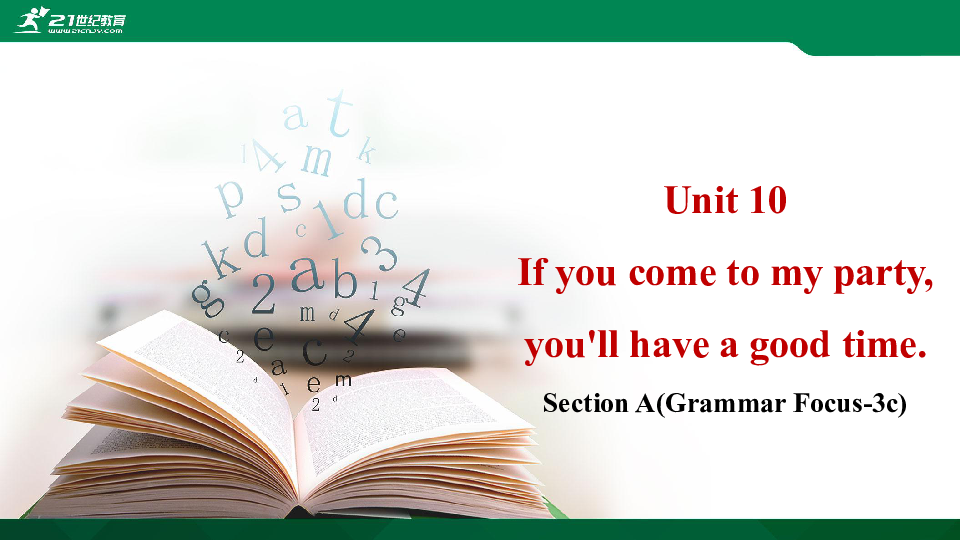(
课件网) Unit 10 If you come to my party, you'll have a good time. Section A(Grammar Focus-3c) A:What will happen if you …? B: If I…, … stay up late last night A:What will happen if you …? B: If I…, … don’t dress warmly enough I think I'll take the bus to the party. If you do, you'll be late. I think I'll stay at home. If you do, you'll be sorry. What will happen if they have the party today? If they have it today, half the class won't come. Should we ask people to bring food? If we ask people to bring food, they'll just bring potato chips and chocolate. if 引导的条件状语从句 (1)“主将从现”原则。 当主句用一般将来时时,if引导的条件状语从句用一般现在时,我们称之为“主将从现”原则。 Johnson won’t answer the phone if he_____ the number.【广东】 A. knew B. will know C. doesn’t know D. didn’t know C (2)如果主句含有must, may, can等情态动词,if引 导的条件状语从句也用一般现在时。 (3)如果主句是祈使句,if引导的条件状语从句 同样用一般现在时。 此结构也可转化为:祈使句+ and/or + 一般将来时。 eg: If you work hard, you will pass the exam. = Work hard, and you will pass the exam. 如果你努力学习,你就能通过考试。 ★if从句的时态根据实际情况而定。 eg: I don’t know if he will come to school tomorrow. 我不知道明天他是否来学校。 No one tells me if Tom went out last night. 没人告诉我汤姆昨天晚上是否出去了。 拓展 if作“是否”讲,引导宾语从句的用法。 —Celia, join us in the Super Summer Camp if it _____ this weekend. —I’d love to. But nobody knows if it . A. is fine; rains B. is fine; will rain C. will be fine; will rain D. will be fine; rains B 1.We _____ (go) to the zoo if it _____ (not rain) tomorrow. 2.If you helped me with my English , I _____ (not fail) the exam. 3.If I _____ ( not finish )my homework, my mother_____ (be) mad at me . 4.I _____ ( return) the CDs to you ,if I _____(have) time tomorrow . 5.I don’t know if it _____(rain) tomorrow, if it _____(rain) , I _____(not go )out . will go doesn’t rain wouldn’t fail don’t finish will be will return have will rain rains won’t go should的用法 1. should为情态动词,意为“应该;应当”,后接动词原 形,无人称和数的变化。 (1)should意为“应该”,表示劝告或建议。 You should stop eating junk food. 你应该停止吃垃圾食品了。 (2)should表示要求或命令。 You shouldn't eat in class. 你不许在课堂上吃东西。 (3)should表示预测或可能。 He should be in the classroom. 他可能在教室里。 (4)should有时表示说话人的感情,如惊讶、愤怒、失望等。 Why should I go? 为什么是我去? 2.基本句式 肯定句:sb. should +动词原形. Maybe you should say sorry. 也许你应该说对不起。 否定句:sb. shouldn't +动词原形. You shouldn't eat in the classroom. 你不应该在教室里吃东西。 一般疑问句:should sb.+动词原形? Should she come here this afternoon? 下午她应该来这里吗? Dear Su Mei, I don’t _____ (know) what to _____ (do) about going to Mike’s birthday party tomorrow night. My parents _____ (think) I should study for my English exam next week. If I _____ (go) to the party, they ... ...

